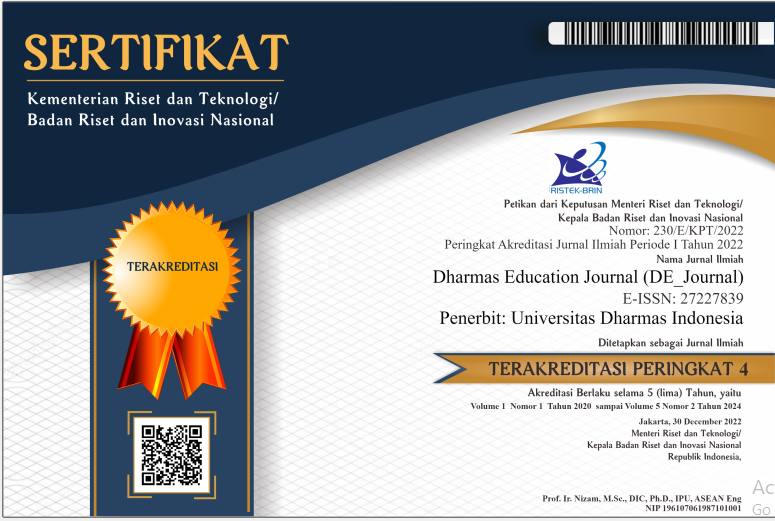PENERAPAN MODEL PEMBELAJARAN PROJECT BASED LEARNING DALAM KEMAMPUAN BERBICARA (SPRECHEN) LEVEL A1 MAHASISWA
DOI:
https://doi.org/10.56667/dejournal.v5i1.1337Keywords:
Keterampilan Berbicara (Sprechen), PBL, mahasiswaAbstract
Globalisasi dan perkembangan teknologi menuntut peningkatan kualitas pendidikan, khususnya dalam penguasaan bahasa asing. Penelitian ini bertujuan untuk mengevaluasi efektivitas penerapan model pembelajaran Project Based Learning (PBL) dalam meningkatkan kemampuan berbicara (Sprechen) level A1 pada mahasiswa semester I program studi Bahasa Jerman di FKIP Universitas HKBP Nommensen Pematangsiantar. Desain penelitian yang digunakan adalah studi kasus deskriptif, dengan partisipan sebanyak 30 mahasiswa. Data dikumpulkan melalui observasi selama satu semester dan wawancara mendalam. Hasil penelitian menunjukkan bahwa penerapan PBL secara signifikan meningkatkan kepercayaan diri, keterampilan kolaboratif, kreativitas, dan kemampuan berpikir kritis mahasiswa dalam berbicara bahasa Jerman. Mahasiswa menunjukkan respon positif terhadap metode PBL, merasa lebih terlibat dan termotivasi dalam proses pembelajaran. Penelitian ini menyimpulkan bahwa PBL adalah metode yang efektif untuk meningkatkan kemampuan berbicara bahasa Jerman level A1 dan merekomendasikan penerapannya secara lebih luas dalam kurikulum bahasa asing
Downloads
References
K. M. (2023a). Project-Based Learning for 21st-Century Skills: An Overview and Case Study of Moral Education in the UAE. The Social Studies, 114(3), 125–136.
Almazroui, K. M. (2023b). Project-Based Learning for 21st-Century Skills: An Overview and Case Study of Moral Education in the UAE. The Social Studies, 114(3), 125–136. https://doi.org/10.1080/00377996.2022.2134281
Ansori, M. (2019). Pengaruh Metode Pembelajaran Collaboration Problem Solving terhadap Hasil Belajar Matematika Siswa dengan Mengendalikan IQ dan Motivasi Belajar. Dirasah: Jurnal Studi Ilmu Dan Manajemen Pendidikan Islam, 2(2), 1–22. https://doi.o Almazroui rg/https://ejournal.iaifa.ac.id/index.php/dirasah
Bogaerds-Hazenberg, S. T. M., Evers-Vermeul, J., & Bergh, H. (2021). A Meta‐Analysis on the Effects of Text Structure Instruction on Reading Comprehension in the Upper Elementary Grades. Reading Research Quarterly, 56(3), 435–462. https://doi.org/10.1002/rrq.311
Bradley, J., Moore, E., Simpson, J., & Atkinson, L. (2018). Translanguaging space and creative activity: theorising collaborative arts-based learning. Language and Intercultural Communication, 18(1), 54–73. https://doi.org/10.1080/14708477.2017.1401120
Damayanti, S., Nanggala, A., & Suryadi, K. (2023). Building Smart And Good Young Citizens Through Project-Based Learning In Civic Education As A Means Of Preventing Cyberbullying In The Digitalization Era. InternationaL SEMINAR, 5, 113–124. https://conference.unita.ac.id/index.php/conference/article/view/106
Febrolianti, E. (2022). Upaya Meningkatkan Prestasi Belajar Pendidikan Agama Islam Dengan Menerapkan Model Pembelajaran Kolaborasi Pada Siswa Kelas VII A. GUAU: Jurnal Pendidikan Profesi Guru Agama Islam, 2(7), 99–116. https://doi.org/PENGEMBANGAN PERANGKAT PEMBELAJARAN MODEL KOLABORATIF GRINRE PADA PERKULIAHAN KONSEP DASAR BAHASA DAN SASTRA INDONESIA
Heaviside, H. J., Manley, A. J., & Hudson, J. (2018). Bridging the gap between education and employment: a case study of problem-based learning implementation in Postgraduate Sport and Exercise Psychology. Higher Education Pedagogies, 3(1), 463–477. https://doi.org/10.1080/23752696.2018.1462095
Hermanto, I., Sarwi, S., & Yusuf, A. (2020). Effectiveness of Project-based Learning Model to Improve Students’ Cognitive Skills.
Kurniasih, H. D., Mastur, Z., & Juhana, J. (2023). Project Based Learning (PjBL) Models with Folklore Nuance to Enhance Students’ Writing Skills and Self-Confidence. Scaffolding: Jurnal Pendidikan Islam dan Multikulturalisme, 5(2), 451–465. https://doi.org/10.37680/scaffolding.v5i2.3087
Lassiter, L. E. (2022). The Chicago guide to collaborative ethnography. In The Chicago Guide to Collaborative Ethnography. University of Chicago Press. https://doi.org/https://doi.org/10.7208/chicago/9780226467016
Li, Y., & Wang, L. (2018). Using iPad-based mobile learning to teach creative engineering within a problem-based learning pedagogy. Education and Information Technologies, 23(1), 555–568. https://doi.org/10.1007/s10639-017-9617-y
Lieftink, B., Smits, A., & Lauche, K. (2019). Dual dynamics: Project-based institutional work and subfield differences in the Dutch construction industry. International Journal of Project Management, 37(2), 269–282. https://doi.org/10.1016/j.ijproman.2018.03.005
Okkinga, M., van Steensel, R., van Gelderen, A. J. S., & Sleegers, P. J. C. (2018). Effects of reciprocal teaching on reading comprehension of low-achieving adolescents. The importance of specific teacher skills. Journal of Research in Reading, 41(1), 20–41. https://doi.org/10.1111/1467-9817.12082
Pusparini, R., & Widyanarko, B. (2021). Puppet as a Medium in Project-Based Learning (PBL) to Promote English Language Competencies. International Joint Conference on Arts and Humanities 2021 (IJCAH 2021), 195–203.
Septarianto, M. F., Astutik, S., Kurnianto, F. A., Kantun, S., & Pangastuti, E. I. (2022). Pengaruh Model Pembelajaran Collaborrative Creativity (CC) Berbasis Daring & Luring Terhadap Kemampuan Kolaboratif Ilmiah dan Hasil Belajar Geografi Siswa. MAJALAH PEMBELAJARAN GEOGRAFI, 5(2), 69–81. https://doi.org/https://jurnal.unej.ac.id/index.php/PGEO/article/view/33138
Sergeeva, N., & Kortantamer, D. (2021). Enriching the concept of authentic leadership in project-based organisations through the lens of life-stories and self-identities. International Journal of Project Management, 39(7), 815–825. https://doi.org/10.1016/j.ijproman.2021.09.001
Sipayung, H. D. (2018). Pengaruh model pembelajaran collaborative inquiry terhadap keterampilan 4C siswa Di SMA. UNIMED. http://digilib.unimed.ac.id/id/eprint/30936
Vogler, J. S., Thompson, P., Davis, D. W., Mayfield, B. E., Finley, P. M., & Yasseri, D. (2018). The hard work of soft skills: augmenting the project-based learning experience with interdisciplinary teamwork. Instructional Science, 46(3), 457–488. https://doi.org/10.1007/s11251-017-9438-9
Wahyuni, R. D. I., Alam, H. V., & Laliyo, L. A. R. (2023). Strengthening the Profile of Pancasila Students through Extracurricular Activities of the Project Learning-Based Waste Bank Program (PjBL). Novateur Publications, 1, 113–124. http://novateurpublication.org/index.php/np/article/view/75
Walunj, V., Gharibi, G., Alanazi, R., & Lee, Y. (2022). Defect prediction using deep learning with Network Portrait Divergence for software evolution. Empirical Software Engineering, 27(5), 118. https://doi.org/10.1007/s10664-022-10147-0
Warr, M., & West, R. E. (2020). Bridging Academic Disciplines with Interdisciplinary Project-based Learning. Interdisciplinary Journal of Problem-Based Learning, 14(1). https://doi.org/10.14434/ijpbl.v14i1.28590
Downloads
Published
How to Cite
Issue
Section
License
Copyright (c) 2024 Dharmas Education Journal (DE_Journal)

This work is licensed under a Creative Commons Attribution-NonCommercial-NoDerivatives 4.0 International License.
Makalah yang disampaikan diasumsikan tidak mengandung bahan propietary yang tidak dilindungi oleh hak paten














